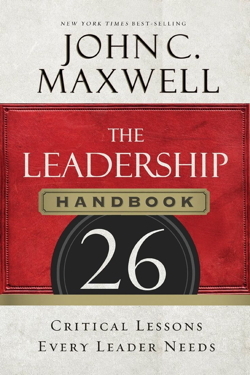 I recently read John C. Maxwell's reissued book, The Leadership Handbook: 26 Critical Lessons Every Leader Needs. I've become interested in the topic of leadership because of my work in studying, practicing, and teaching Christian contemplative prayer. So I read this book as fodder for a larger question I'm pondering: Can contemplation help us not only grow spiritually, but become more effective in our life skills as well?
I recently read John C. Maxwell's reissued book, The Leadership Handbook: 26 Critical Lessons Every Leader Needs. I've become interested in the topic of leadership because of my work in studying, practicing, and teaching Christian contemplative prayer. So I read this book as fodder for a larger question I'm pondering: Can contemplation help us not only grow spiritually, but become more effective in our life skills as well?
Maxwell comes from a Wesleyan background, which is part of the holiness tradition, with roots in the teachings of John Wesley. In other words, he is not self-consciously contemplative, although he is clearly someone who takes his faith seriously; even though this book is presented as a guide for leaders in any context, the author's faith is mentioned repeatedly. I've never met Maxwell, but reading this book I suspect he could be what Thomas Merton called a "masked contemplative," which is to say someone who embraces a contemplative stance even if he or she never formally engages in meditative or contemplative prayer. I suspect this because many of the "leadership lessons" Maxwell advocates are clearly consistent with a contemplative approach to life.
Over the course of the twenty-six lessons, Maxwell insists that relationships are critical to leadership, that listening is essential, and that effective leaders work on being focused and attentive. His chapter on "don't send your ducks to eagle school" (i.e., when managing people, understand and work with their unique strengths and weaknesses) sounds like something Saint Benedict himself could have written. He depicts high-performing leaders as lifelong learners and continually asking questions. He also recognizes that the hardest person to lead is one's own self, and that experience is useless if we don't take the time to reflect on it, evaluate it, and learn from it.
If you could summarize this book, I think John C. Maxwell is basically saying to be a world-class leader, we have to discipline our own egos. He avoids using explicitly religious language like humility, forgiveness, or obedience, but those qualities certainly inform his message. He seems to be assuming that the person who is likely to read this book is already fairly aggressive and self-directed, but now needs to learn to relate to others, to ask questions, and to be comfortable with not always immediately having the answer.
What spoke to me personally in this book was his emphasis on mentoring young persons to be the next generation of leaders -- part of being a good leader is cultivating those who will lead after we are gone. It's a question of legacy, and maybe that's meaningful to me because of where I am in my life (my mid-50s), but of course I also think about that in terms of my work. I no longer manage people on a daily basis, but I work with both individuals and churches that are embracing contemplative spirituality. Perhaps the contemplative community needs to be asking this same question: how do we foster young people (and congregations) to lead and teach a spirituality of radical trust, listening, waiting, and silence? How does this affect their leadership? Great questions, and ones I hope to be exploring in my work in the future.
But back to John C. Maxwell. You don't have to be a contemplative to find inspiration in his writing. But if you are contemplative, you'll find plenty of encouragement -- for a willingness to embrace not-knowing, to rely on others, and to always listen: these are not the signs of a weak leader, but precisely the marks of a strong one.
I will be leading a retreat on contemplative leadership, drawing from the wisdom of St. Benedict and St. Ignatius of Loyola, May 15-17, 2015, in Monteagle, TN. For more information, click here: Mindful Discernment, Contemplative Community Retreat
Disclosure: The publisher supplied me with a review copy of this book; my review reflects my honest opinion of the book.